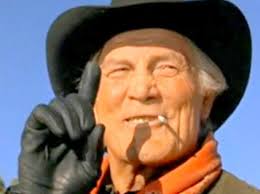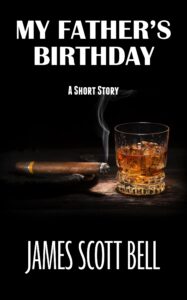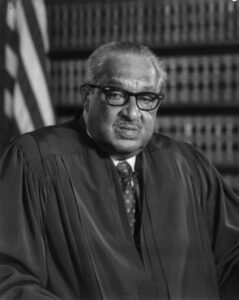by James Scott Bell
@jamesscottbell
In my second year of law school I was part of the Hale Moot Court Honors board. Moot court is a rite of passage for most law students. It’s a mock appellate case with rounds of oral argument before panels of law professors, local attorneys, and perhaps a judge or two. At USC, at least when I was there, the final round was in front of two federal appellate judges and one Justice of the United States Supreme Court.
This particular year our Supreme Court Justice was Thurgood Marshall.
Marshall was, of course, the first African American appointed to the high court. He was also famous for arguing, and winning, the landmark case of Brown v. Board of Education (1954), which overturned racial segregation in public schools. Being an enthusiastic student of trial lawyers and oral advocacy, I knew that the other side of Brown was argued by one of the most successful Supreme Court lawyers of all time, John W. Davis.
So when I asked Justice Marshall what it was like to go up against Davis, he seemed pleased that I knew about him, and said he was a formidable foe.
Oh, wait. I forgot to mention that I made sure I was selected to pick up Justice Marshall and his wife, Cecilia, at LAX and drive them across town to the campus.
That’s because I wanted to ask Thurgood Marshall a specific question.
So there I was in my green Ford Maverick, sitting as close to a Supreme Court Justice as I will ever get, answering his queries about my law studies, the moot court competition, and life in Los Angeles.
At an opportune moment I said, “Justice Marshall, you’ve delivered and heard so many arguments over the years. What would you say are the characteristics of a great oral argument?”
Without hesitation he said, “The best oral arguments have one main point, and only one.”
Which surprised me. I thought he’d say something about voice and style and performance. Instead, he explained that winning arguments have a precise legal point around which everything else revolves. The advocate’s job is to find that point and apply all his powers of persuasion toward supporting it.
Years later, I heard a similar bit of wisdom from the philosopher Curly. Remember City Slickers? There’s a scene where Curly (Jack Palance) is riding next to Mitch (Billy Crystal) and says, “You know what the secret of life is?”
“No,” Mitch says. “What?
 “This.” Curly raises his index finger.
“This.” Curly raises his index finger.
“Your finger?”
“One thing. Just one thing.”
“That’s great. But what’s the one thing?”
“That’s what you gotta figure out.”
Okay, let’s bring all this to bear on writing. In my Story Grinder workshops I ask the students to give me one word that describes what their story is about. In my most recent workshop I got answers such as redemption, forgiveness, justice, revenge.
One student said, “Amnesia.” Which was true on a surface level. I asked him to dig deeper. “What one word describes the heart of your novel?” (He should have said, “I can’t remember,” but we won’t go there.) He thought about it and said, “Identity.”
That was it! He had pinpointed the blood pumping through the veins of his plot. Which is the point of the exercise. When find the right word, you’ll know it. You’ll feel it. And you can use that feeling every time you sit down to work on your story.
Think about your current WIP:
- What is your main character longing for? Why?
- What is your main character fighting for? Why? (I mean really…why?)
- What will your main character know at the end that he doesn’t know at the beginning?
- How will what he learns change him?
- Imagine your character a year after the story ends, and another character asks, “Why on earth did you have to go through all that?” How would your character answer?
NOW…give us the one word that describes the heart of your WIP. Where did that come from? Is this a one-off, or do you see this word as a common thread in your other work?
***
 NOTE: I have a FREE short story available today for your Kindle — My Father’s Birthday. It’s a story on the literary side and I hope you enjoy it.
NOTE: I have a FREE short story available today for your Kindle — My Father’s Birthday. It’s a story on the literary side and I hope you enjoy it.
Have a Happy Thanksgiving!

